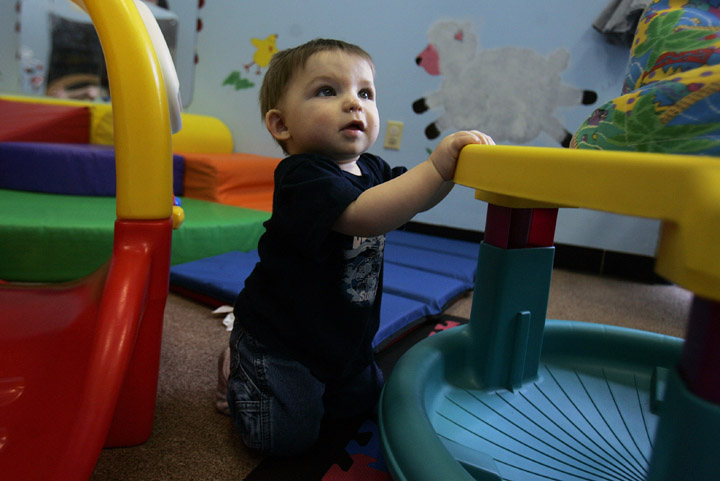TORONTO – You have the flashcards, educational DVDs and flip books ready to go for your newborn baby’s budding brain. But a Canadian study is questioning the benefits of these products.

The researchers say that there’s no effect on babies’ learning after using these educational tools – they’re just too young.
“Like many people, we saw commercials on TV for products promising to teach babies to read,” Dr. Tanya Kaefer, a Lakehead University professor, told Global News.
Kaefer studies sources of childhood education. Parents often asked her team if the promises in commercials were accurate but she couldn’t say – it was the product marketers doing the research. So she sought out to look into the claims herself.
“It’s completely natural for parents to want to give their children the best possible chance at future health and happiness, including academic success…I think these products prey on parents’ love for their child and their desire for their child to have and be the best,” Kaefer told Global News.
She collaborated with University of Toronto and New York University scientists for the study, published in the Journal of Educational Psychology.
READ MORE: Sleep machines may be harmful to babies’ hearing, speech: study
The researchers zeroed in on an educational system that allegedly teaches babies to read. It came with a video, flash cards and a picture book.
Then about 120 babies, between nine to 18 months, were split into two groups: over the course of seven months, one group was assigned to the educational product and the other group wasn’t.
They took a number of tests to create a baseline – that way, the scientists knew there was no difference between these two groups before they took on their different paths.
During the seven months, the babies were regularly tested at home, and in the lab: eye movements, attention span and what the babies focused on were all looked at.
“Essentially, we gave them every chance we could to show any kind of reading-related knowledge and found no effects. Because it’s impossible to measure everything forever, there’s always the chance that media contributed to growth in a way that we were unable to measure,” Kaefer told Global News.
READ MORE: Newborn baby’s smell is as addictive as drugs or food
At the end of it all, both groups of babies fared the same with the testing.
(In 2009, Baby Einstein, another company that marketed educational DVDs, offered full refunds to parents after it was legally challenged on the legitimacy of its claims that it helped babies learn words.)
The silver lining is that the products made parents happy – in exit interviews, parents believed their babies were learning to read and had a developed vocabulary.
Babies are born ready to learn – at birth, their brains already contain 100 billion neurons, and produce trillions more connections between the neurons right after being born, according to Dr. Alyson Shaw, a paediatrician and member of the Canadian Paediatric Society.
“At birth, babies can already recognize their mother’s voice and speech patterns. They read signals all around them by listening to voices, watching faces and reading body language,” Shaw told Global News.
READ MORE: MTV’s ’16 & Pregnant’ may have halted teen pregnancy rate
Over the span of seven months, babies go through a lot of developmental changes. But understanding pictures on flash cards, identifying symbols, written words or letters may be too ambitious.
“Understanding what one’s reading requires a lot of processing power that infants typically haven’t yet sufficiently developed,” Kaefer said. Even controlling eye movements doesn’t happen until school-age.
Newborns are too young to understand words of a particular story or song, but they’re picking up on rhythms and sounds of their parents’ voices. Babies learn that books are valued and important when they see their parents reading, Shaw said.
READ MORE: How a father’s diet, lifestyle affect his baby’s healthy development
What does this mean for parents? Kaefer said she, personally, would be “very cautious” about buying materials touted as “educational” for baby.
“How parents choose to spend their time and money is entirely up to them.”
Shaw says that parents don’t need “fancy” equipment, like DVDs or flip cards. Instead, they need to engage with their babies, whether it be through talking, singing or reading to them.
“When you read, speak or sing with your baby, not only are you strengthening that special attachment between parent and baby that is so necessary for healthy development, but you are exposing them to the rhythms and sounds of language that are at the basis for learning to read,” Shaw told Global News.
READ MORE: Childbirth economics: What older moms and teenage pregnancy say about opportunity in Ontario
“Babies learn best with face-to-face interaction with a live – not electronic – loving caregiver,” she said.
Kaefer’s complete findings were published in the Journal of Educational Psychology.
carmen.chai@globalnews.ca
Follow @Carmen_Chai




Comments